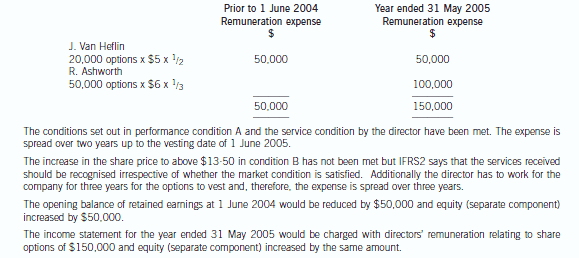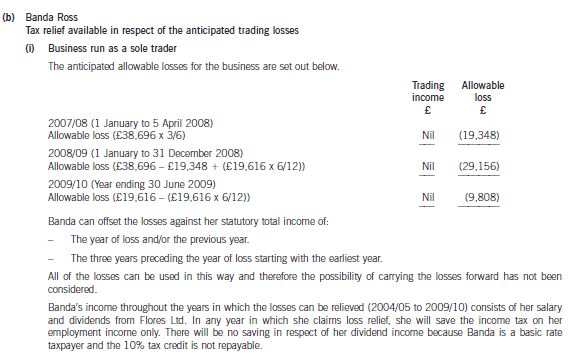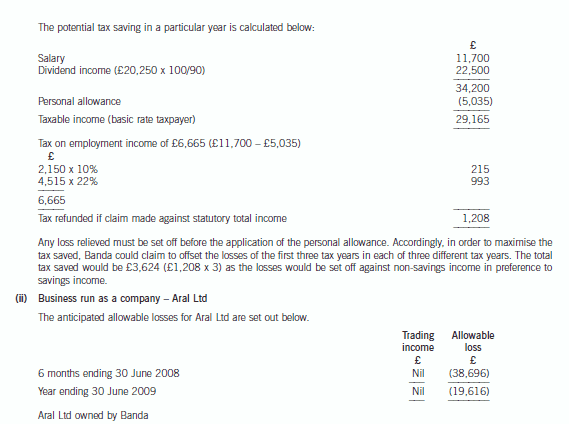2019年ACCA考试《高级财务管理(专业阶段)》每日一练(2019-03-22)
发布时间:2019-03-22
In
which of the following situations is it NOT possible for a third party to
enforce an obligation?
A.Where
there has been an assignment of the benefit of the contract
B.Where
the subject matter of the agreement is a gratuitous promise
C.Where
the contract expressly confers the right for a third party to gain enforcement
rights
下面小编为大家准备了 ACCA考试 的相关考题,供大家学习参考。
3 (a) Leigh, a public limited company, purchased the whole of the share capital of Hash, a limited company, on 1 June
2006. The whole of the share capital of Hash was formerly owned by the five directors of Hash and under the
terms of the purchase agreement, the five directors were to receive a total of three million ordinary shares of $1
of Leigh on 1 June 2006 (market value $6 million) and a further 5,000 shares per director on 31 May 2007,
if they were still employed by Leigh on that date. All of the directors were still employed by Leigh at 31 May
2007.
Leigh granted and issued fully paid shares to its own employees on 31 May 2007. Normally share options issued
to employees would vest over a three year period, but these shares were given as a bonus because of the
company’s exceptional performance over the period. The shares in Leigh had a market value of $3 million
(one million ordinary shares of $1 at $3 per share) on 31 May 2007 and an average fair value of
$2·5 million (one million ordinary shares of $1 at $2·50 per share) for the year ended 31 May 2007. It is
expected that Leigh’s share price will rise to $6 per share over the next three years. (10 marks)
Required:
Discuss with suitable computations how the above share based transactions should be accounted for in the
financial statements of Leigh for the year ended 31 May 2007.
(a) The shares issued to the management of Hash by Leigh (three million ordinary shares of $1) for the purchase of the company
would not be accounted for under IFRS2 ‘Share-based payment’ but would be dealt with under IFRS3 ‘Business
Combinations’.
The cost of the business combination will be the total of the fair values of the consideration given by the acquirer plus any
attributable cost. In this case the shares of Leigh will be fair valued at $6 million with $3 million being shown as share capital
and $3million as share premium. However, the shares issued as contingent consideration may be accounted for under IFRS2.
The terms of the issuance of shares will need to be examined. Where part of the consideration may be reliant on uncertain
future events, and it is probable that the additional consideration is payable and can be measured reliably, then it is included
in the cost of the business consideration at the acquisition date. However, the question to be answered in the case of the
additional 5,000 shares per director is whether the shares are compensation or part of the purchase price. There is a need
to understand why the acquisition agreement includes a provision for a contingent payment. It is possible that the price paid
initially by Leigh was quite low and, therefore, this then represents a further purchase consideration. However, in this instance
the additional payment is linked to continuing employment and, therefore, it would be argued that because of the link between
the contingent consideration and continuing employment that it represents a compensation arrangement which should be
included within the scope of IFRS2.
Thus as there is a performance condition, (the performance condition will apply as it is not a market condition) the substance
of the agreement is that the shares are compensation, then they will be fair valued at the grant date and not when the shares
vest. Therefore, the share price of $2 per share will be used to give compensation of $50,000 (5 x 5,000 x $2). (Under
IFRS3, fair value is measured at the date the consideration is provided and discounted to presented value. No guidance is
provided on what the appropriate discount rate might be. Thus the fair value used would have been $3 per share at 31 May
2007.) The compensation will be charged to the income statement and included in equity.
The shares issued to the employees of Leigh will be accounted for under IFRS2. The issuance of fully paid shares will be
presumed to relate to past service. The normal vesting period for share options is irrelevant, as is the average fair value of the
shares during the period. The shares would be expensed at a value of $3 million with a corresponding increase in equity.
Goods or services acquired in a share based payment transaction should be recognised when they are received. In the case
of goods then this will be when this occurs. However, it is somewhat more difficult sometimes to determine when services
are received. In a case of goods the vesting date is not really relevant, however, it is highly relevant for employee services. If
shares are issued that vest immediately then there is a presumption that these are a consideration for past employee services.
(b) a discussion (with suitable calculations) as to how the directors’ share options would be accounted for in the
financial statements for the year ended 31 May 2005 including the adjustment to opening balances;
(9 marks)
(b) Accounting in the financial statements for the year ended 31 May 2005
IFRS2 requires an expense to be recognised for the share options granted to the directors with a corresponding amount shown
in equity. Where options do not vest immediately but only after a period of service, then there is a presumption that the
services will be rendered over the ‘vesting period’. The fair value of the services rendered will be measured by reference to
the fair value of the equity instruments at the date that the equity instruments were granted. Fair value should be based on
market prices. The treatment of vesting conditions depends on whether or not the conditions relate to the market price of the
instruments. Market conditions are effectively taken into account in determining the fair value of the instruments and therefore
can be ignored for the purposes of estimating the number of equity instruments that will vest. For other conditions such as
remaining in the employment of the company, the calculations are carried out based on the best estimate of the number of
instruments that will vest. The estimate is revised when subsequent information is available.
The share options granted to J. Van Heflin on 1 June 2002 were before the date set in IFRS2 for accounting for such options
(7 November 2002). Therefore, no expense calculation is required. (Note: candidates calculating the expense for the latter
share options would be given credit if they stated that the company could apply IFRS2 to other options in certaincircumstances.) The remaining options are valued as follows:

(b) Briefly explain THREE limitations of negotiated transfer prices. (3 marks)
(b) Negotiated transfer prices suffer from the following limitations:
– The transfer price which is the final outcome of negotiations may not be close to the transfer price that would be optimal
for the organisation as a whole since it can be dependent on the negotiating skills and bargaining powers of individual
managers.
– They can lead to conflict between divisions which may necessitate the intervention of top management to mediate.
– The measure of divisional profitability can be dependent on the negotiating skills of managers who may have unequal
bargaining power.
– They can be time-consuming for the managers involved, particularly where large numbers of transactions are involved.
(b) The tax relief available in respect of the anticipated trading losses, together with supporting calculations and
a recommended structure for the business. (16 marks)


Aral Ltd owned by Banda
The losses would have to be carried forward and deducted from the trading profits of the year ending 30 June 2010.
Aral Ltd cannot offset the loss in the current period or carry it back as it has no other income or gains.
Aral Ltd owned by Flores Ltd
The two companies will form. a group relief group if Flores Ltd owns at least 75% of the ordinary share capital of Aral
Ltd. The trading losses could be surrendered to Flores Ltd in the year ending 30 June 2008 and the year ending
30 June 2009. The total tax saved would be £11,079 ((£38,696 + £19,616) x 19%)
Recommended structure
The Aral business should be established in a company owned by Flores Ltd.
This will maximise the relief available in respect of the trading losses and enable relief to be obtained in the period in
which the losses are incurred.
Tutorial note
The whole of the loss for the period ending 30 June 2008 can be surrendered to Flores Ltd as it is less than that
company’s profit for the corresponding period, i.e. £60,000 (£120,000 x 6/12).
声明:本文内容由互联网用户自发贡献自行上传,本网站不拥有所有权,未作人工编辑处理,也不承担相关法律责任。如果您发现有涉嫌版权的内容,欢迎发送邮件至:contact@51tk.com 进行举报,并提供相关证据,工作人员会在5个工作日内联系你,一经查实,本站将立刻删除涉嫌侵权内容。
- 2019-03-16
- 2019-01-04
- 2019-01-04
- 2019-03-22
- 2019-03-22
- 2019-03-16
- 2019-01-04
- 2019-01-04
- 2019-03-16
- 2019-01-04
- 2019-03-22
- 2019-01-04